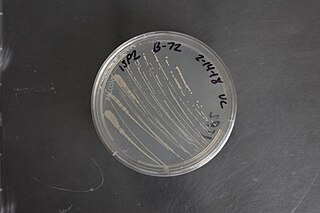
The Bacillota are a phylum of bacteria, most of which have gram-positive cell wall structure. The renaming of phyla such as Firmicutes in 2021 remains controversial among microbiologists, many of whom continue to use the earlier names of long standing in the literature.

The 9M133 Kornet is a Russian man-portable anti-tank guided missile (ATGM) intended for use against main battle tanks. It was first introduced into service with the Russian army in 1998.
Anaeroplasmatales is an order of mollicute bacteria which are generally found in the rumens of cattle and sheep. The only family in the order is the family Anaeroplasmataceae.
Rubrobacter is a genus of Actinomycetota. It is radiotolerant and may rival Deinococcus radiodurans in this regard.
The Halanaerobiales are an order of bacteria placed within the class Clostridia, and encompassing two families, the Halanaerobiaceae and the Halobacteroidaceae. Originally placed within the highly polyphyletic class Clostridia, according to the NCBI and LPSN, it is now thought to lie outside the Bacillota. Halanaerobiales are halophilic obligate anaerobes with a fermentative or homoacetogenic metabolism.
Aminobacter aminovorans is a Gram-negative soil bacteria.
Achromobacter marplatensis is a Gram-negative bacterium from the genus Achromobacter which was isolated from a pentachlorophenol-contaminated soil in Mar del Plata by Murialdo et al.
Psychrobacter submarinus is a Gram-negative, oxidase- and catalase-positive, psychrophilic, halophilic nonmotile aerobic bacterium of the genus Psychrobacter, which was isolated from seawater at a depth of 300 m from the Pacific Ocean.
Acidomonas methanolica is an acidophilic, facultatively methylotrophic bacterium from the genus Acidomonas, which was isolated from septic methanol yeast in East Germany. Acidomonas methanolica is the only known species from the genus Acidomonas.
Aminobacter aganoensis is a bacterium from the genus of Aminobacter which was isolated from soil.
Aminobacter anthyllidis is a bacterium from the genus of Aminobacter.
Aminobacter ciceronei is a bacterium from the genus of Aminobacter which was isolated from agricultural soil in California in the United States. Aminobacter anthyllidis has the ability to degrade Chloromethane and Bromomethane.
Aminobacter niigataensis is a bacterium from the genus of Aminobacter which was isolated from soil.
Angulomicrobium amanitiforme is a bacterium from the genus Angulomicrobium which was isolated from a fresh water pond in the United Kingdom.

Gluconobacter is a genus of bacteria in the acetic acid bacteria family. They prefer sugar-rich environments, so are sometimes found as a spoilage organism in beer. They are not known to be pathogenic but can cause rot in apples and pears. They are used alone or with acetobacter for microbial degradation of ethanol
Aminobacter carboxidus is a bacterium from the genus Aminobacter which has been isolated from soil in Moscow in Russia.


